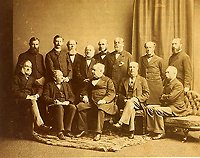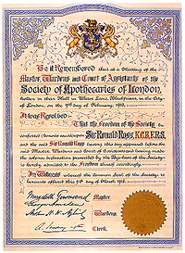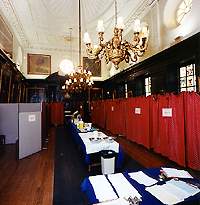Medical Reform and Development
During the Middle Ages, apothecaries were usually members of trade and craft guilds and in London had a section within the Grocers’ Company. In 1518 Henry VIII chartered the (later Royal) College of Physicians whose Fellows and members were largely graduates of Oxford or Cambridge Universities. The College, along with the Grocers’ Company, was endowed with a right to inspect apothecaries' shops, and was able to impose stringent quality controls on raw drugs and medicinal preparations. However, apothecaries frequently flouted the authority of the Physicians by dispensing medicines without a prescription.
After gaining its independence from the Grocers’ Company in 1617, the Society of Apothecaries and the College were at bitter variance over these issues for many years. In 1704 a test case went to appeal in the House of Lords when William Rose, a freeman of the Society, was prosecuted by the Physicians for visiting a sick man in his home, prescribing medicines for him and dispensing them.
Bowing to recognised common practise, the Lords ruled in favour of the apothecary, for Physicians were relatively few in number and most people could not afford their fees. This judgment ratified the apothecarys’ status as members of the medical profession, and thus apothecaries evolved into general practitioners of medicine (today's GPs).
Medical reform and regulation of the profession, especially with regard to education and training, became a major concern at the close of the eighteenth century. Disquiet arose around the significant numbers of unqualified practitioners of medicine, and in the rise of chemists and druggists. Members of the Society of Apothecaries were at the forefront of the movement which gathered momentum between 1810 and 1814 and resulted in the Apothecaries' Act of 1815.

(Court of Examiners - 1880)
This statute empowered the Society to institute a Court of Examiners to conduct examinations and to grant licences to successful candidates to practise medicine throughout England and Wales. It gave the Society the duty of regulating medical practice, which the Society effectively did until the General Medical Council was set up by an act of parliament in 1858.
John Keats, poet, qualified as a Licentiate of the Society (LSA) in July 1816; Elizabeth Garrett, later Garrett Anderson, became the first woman doctor to qualify in Britain when she obtained her Licence in 1865, and Ronald Ross, the second Nobel Prize-winner in Medicine or Physiology (1902), qualified LSA in 1881

(Honorary Freedom of the Society awarded to Sir Ronald Ross in 1915 in recognition of his research on the transmission of malaria by mosquitoes)
The 1815 Act was worded such that it did nothing to prejudice the trade of chemists and druggists, who, as the Society became more medical, were joined by those apothecaries who continued to practise pharmacy. In 1841, this group came together to form what is now the Royal Pharmaceutical Society of Great Britain. However, the 1815 Act did give statutory sanction to the Society of Apothecaries to examine dispensers and to grant a certificate called 'Assistant to an Apothecary', to hospital and doctors’ dispensers, a qualification that evolved into today's Pharmacy Technician. This qualification however led to impassioned conflict between the Society of Apothecaries and the Pharmaceutical Society on several notable occasions. It was eventually superseded by National Vocational Qualifications (NVQ’s) and ceased to be offered in January 1998.
Since the Medical Act of 1886, the Society's Licence included all aspects of medical training. This was reflected in the new title of this registrable qualification, which was altered by statute in 1907 to the Licence in Medicine and Surgery of the Society of Apothecaries (LMSSA). In 1993 the Society combined with the five English and Scottish Royal Colleges of Physicians and Surgeons to form the United Examining Board (UEB) to conduct the non-university examination for a registrable medical qualification, although the Society and the Colleges continued to award their own licences to successful candidates. Although the licences still exist, the last LMSSA was awarded in 2003 and the UEB was dissolved in 2007.
The Society's role in medical education is further demonstrated by the range of specialist postgraduate diplomas which it has pioneered. In 1928, for example, it introduced the first qualification in Midwifery, the Mastery of Midwifery, which eventually led to the formation of the Royal College of Obstetricians and Gynaecologists. The Diploma of Industrial Health, established in 1946, was recognised by the Faculty of Occupational Medicine of the Royal College of Physicians on its foundation in 1978.

(The Great Hall at Apothecaries' Hall set up for the clinical examination for the Society's Diploma in Genitourinary Medicine)
One of the most recent diplomas, the Medical Care of Catastrophes, was set up following an approach by the Royal Army Medical Corps, and the Diploma in Medical Jurisprudence is a compulsory qualification for a police surgeon in several forces in the country, including the Metropolitan Police.
At present, the Society's Examinations Department administers 7 different diplomas, two of which are taught by the Society's Faculty of the History and Philosophy of Medicine and Pharmacy (established 1959). The Faculty also runs an annual programme of eponymous lectures at Apothecaries' Hall.


